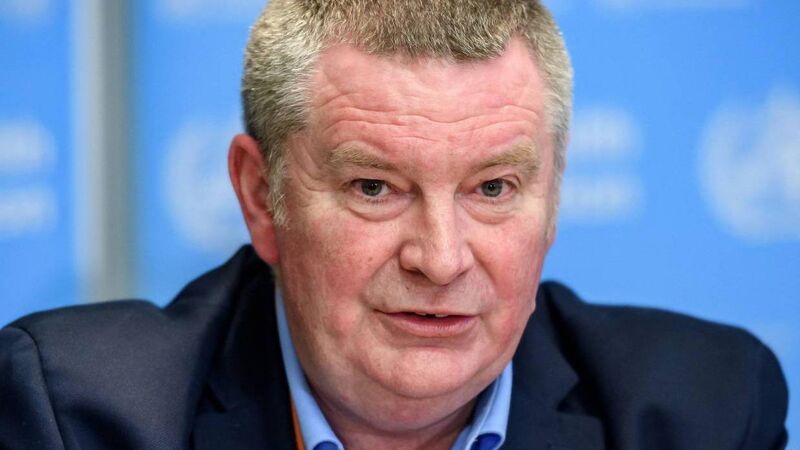Kathriona Devereux: A grand plan to deal with next pandemic, thanks to Irish Mike

After three years of intensive negotiations, including a few very late-night sessions, 194 WHO member states reached a consensus last month on the final wording of a new global Pandemic Accord. It is due to be ratified this week.
Getting that many nations to agree on something as complicated and contentious as pandemic planning is borderline miraculous.
At the final negotiation session, Dr Tedros Ghebreyesus and Dr Mike Ryan both wore green ties to mark the moment the entire text was ‘greened’. Negotiators and colleagues hugged, celebrating the end of a gruelling process and the beginning of a global commitment to pandemic preparedness.
Dr Ryan, who is now departing the WHO, played a crucial role in guiding the world, and Ireland, through the darkest days of covid-19. I often wonder what Ireland’s pandemic response might have been if the man from the WHO urging us to stay at home hadn’t been a Sligo man.
The WHO estimates that around 14.9 million excess deaths occurred globally in 2020 and 2021 - both directly from covid-19 and indirectly due to the strain it placed on health systems.
Although we don’t like to talk about covid times anymore, these deaths underscore the importance of preparing for future outbreaks of a novel disease.
Experts agree it’s not a matter of if, but when the next global pandemic will emerge. The Pandemic Accord aims to enhance prevention, preparedness, and response for whatever virus threatens us next.
The agreement is also a much- needed shot in the arm for public health advocates at a time when decades of progress are unravelling.
The defunding of USAID and the U.S withdrawal from the WHO mean vaccine roll-outs are stalling and outbreak containment teams are reducing. Preventable diseases are resurging.
The climate crisis and senseless wars fuel further instability and humanitarian crises are multiplying.
There has only been one other public health treaty agreed by the WHO. In 2003, following decades of evidence on the dangers of smoking, 183 member states unanimously passed the Framework Convention on Tobacco Control (FCTC).
It required countries to restrict tobacco advertising, apply health warnings on cigarette packaging, and raise tobacco taxes.
Ireland became a global public health leader in 2004 when it introduced a workplace smoking ban - ending smoking in bars and restaurants. Yet two decades after the tobacco treaty, one in five adults globally still consume tobacco, albeit down from one in three in 2000.
‘Big Tobacco’ remains a powerful transnational force, now pivoting to e-cigarettes to addict a new generation of customers.
Experts warn this may be a gateway to traditional smoking, and in Ireland, for the first time in decades, youth smoking rates are rising.
Just as the tobacco treaty was only the start of a long struggle toward a tobacco-free future, the Pandemic Accord will only be effective if it’s implemented.
It aims to enhance global preparedness and equitable access to medical resources during pandemics and balance those goals with the interests of the pharmaceutical industry, who actually make the vaccines and medicines.
This is just an agreement, but it gives us a better fighting chance at saving more lives when the next pandemic strikes.
Last week, Ireland’s Minister for Foreign Affairs, Simon Harris, co-signed a statement alongside his counterparts from Iceland, Luxembourg, Norway, Slovenia, and Spain. It expressed “grave concern about the reported Israeli plans to expand its military operations in Gaza and to establish a prolonged Israeli presence in the Strip”.
The joint declaration called for a ceasefire, an end to the blockade of aid, and a future where Israel and Palestine can live side by side in peace and security.
It got modest media coverage. And then, predictably, nothing changed for the people of Gaza. They are still being starved, still being bombed. As I paradoxically wrote last week: words aren’t working.
Who will intervene to stop the slaughter? Israel has reportedly dropped the equivalent of six atomic bombs on Gaza. The destruction is staggering. And yet the major European powers -France, Germany, the UK - remain silent or complicit.
Ireland, Spain, and Slovenia must now do more than express concern.
As the EU scrambles to respond to the looming threat of Trump-era tariffs, can Simon Harris, Spain’s José Manuel Albares, and Slovenia’s Tanja Fajon use their place at the trade negotiation table to demand that the EU reckon with its responsibilities under international law?
Ireland may be anxious about how new tariffs could upend our economic model - but how can EU Trade and Foreign Ministers sit politely discussing bourbon tariffs while a genocide unfolds across the Mediterranean?
If the EU wants to be taken seriously as a good actor on the world stage, its trade negotiations must reflect its human rights commitments. Ireland, Spain, and Slovenia should rally others to hold Israel accountable.
If the WHO can get 183 countries to agree on a politically sensitive global health treaty, surely the 27 EU member states can find the will to sanction Israel to stop the bombing and starvation of Palestinians.







 App?
App?




